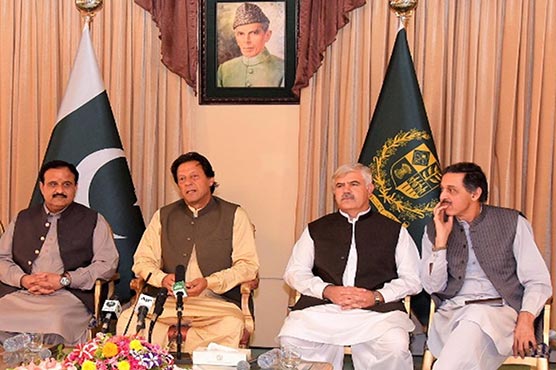PM Imran unveils new plan of local bodies system

Panchayat in Punjab and mayors in metropolises will have direct elections
ISLAMABAD (Dunya News) – Prime Minister Imran Khan on Monday while unveiling new plan of municipal system said that the new local bodies system has been devised after studying international models.
Interacting with senior journalists in Islamabad on Monday, he said that village council will be elected directly and funds will be transferred to village councils directly.
Giving details of the new Punjab Local Government Act 2019, Imran Khan said a direct election would be held in 22,000 village councils in Punjab, for equal distribution of revenue and indiscriminate development of the entire province.
“People need governance,” Prime Minister Imran Khan said and added that the new concept was brought to the fore after lengthy deliberations and study of the Khyber Pakhtunkhwa local government system and similar systems in vogue internationally.
He said it was for the first time that the federal government was handing over its powers to the local bodies. “Our cities are like a heap of rubble … we want our cities to grow and develop, like those in the rest of the world. We want them to generate their own funds and manage issues on their own.”
Imran Khan said under the new law passed by Punjab, the mayor of a city, town and tehsil would be elected directly – in a first in South Asia. He said under the new system a mayor would be required to get a direct mandate from a large number of voters. Mayor of London Sadiq Khan received one million votes, while Erdogan also received a million votes to become mayor of Istanbul.
He said the new mayor would bring in his own team to manage the city affairs and would have to work hard to deliver. The new process would do away with the existing practice of using money in “purchasing loyalties” for votes.
Imran Khan as a comparison mentioned the money generated by Lahore – US 32 million dollars and Karachi – 21 million dollars, which he said could be compared to the funds generated by Tehran – US 500 million dollars, Mumbai – 400 million dollars and Bangalore – 200 million dollars. He said the previous government in Punjab spent 57 per cent of the development funds of the entire province on Lahore alone. He said an amount of over Rs 90,000 per capita was spent on development funds for Lahore, while a paltry Rs 2400 on the development of Rajanpur.
He said under the new law over Rs 400 billion will be devolved for all local government functions and will allocate over 30% – Rs 110 billion for the municipal services. The previous government allocated Rs 50 billion to the local government, however it was mere book transfer and not real devolution.
When asked whether he was facing resistance from the parliamentarians who used to get the funds for local development, Imran Khan said “change is resisted by vested interests,” and added “we have to defeat them.” “Nowhere in the world the MNAs, MPAs are given development funds,” Khan said and pointed that in the past this practice led to duplication and poor management of funds.
“We have learned from experiences and found out that the village councilor was far more effective and had a better understanding of the local issues.” He said some of the changes had been adapted from the existing local government system in Khyber Pakhtunkhwa in the new law in Punjab.
Imran Khan said the new local bodies system will be made viable only if it was able to generate revenue. He said the provinces do not have enough capacity to collect funds under the 18th amendment. He said the viability of this amendment also depended on the success of revenue collection, and hoped that the new local government system would be able to meet the revenue shortfall by being more proactive and collecting the taxes.
Mentioning functions of the Panchayat, the prime minister said it would look after; water supply , sewerage, solid waste management, street lights, births, deaths, marriage registration, dispute resolution, community mobilization , sports and assistance.
He was optimist that the new system would bring self governance to every organic community. A total of 372 rural tehsil, cities and towns would get self-governance. Around143 additional areas would get self-governance compared to 2015 and the right of self-governance would extend to 22,000 mouzas and 2500 urban neighbourhoods.

